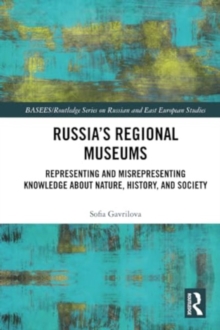
Political Theory and Community Building in Post-Soviet Russia EPUB
Edited by Oleg Kharkhordin, Risto (University of Helsinki, Finland) Alapuro
Part of the BASEES/Routledge Series on Russian and East European Studies series
EPUB
Description
This book revisits many aspects of current social science theories, such as actor-network theory and the French school of science and technology studies, to test how the theories apply in a specific situation, in this case after 1991 in the city of Cherepovets in Russia, home of Russia’s second biggest steel producer, Severstal.
Using political philosophy to analyse the down-to-earth details of the real techno-scientific problems facing the world, the book examines the role of things - and urban infrastructure in particular - in political change.
It considers how the city’s infrastructure, including housing, ICT networks, the provision of public utilities of all kinds, has been transformed in recent years; examines the roles of different actors including the municipal authorities, and explores citizens’ differing and sometimes contradictory images of their city.
It includes a great deal of new thinking on how communities are built, how common action is initiated to provide public goods, and how the goods themselves - physical things – are a crucial driver of community action and community building, arguably more so than more abstract social and human forces.
Information
-
Download - Immediately Available
- Format:EPUB
- Pages:256 pages, 11 Tables, black and white; 2 Line drawings, black and white; 2 Illustrations, black and
- Publisher:Taylor & Francis Ltd
- Publication Date:07/03/2011
- Category:
- ISBN:9781136855108
Information
-
Download - Immediately Available
- Format:EPUB
- Pages:256 pages, 11 Tables, black and white; 2 Line drawings, black and white; 2 Illustrations, black and
- Publisher:Taylor & Francis Ltd
- Publication Date:07/03/2011
- Category:
- ISBN:9781136855108










